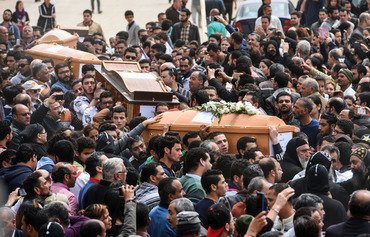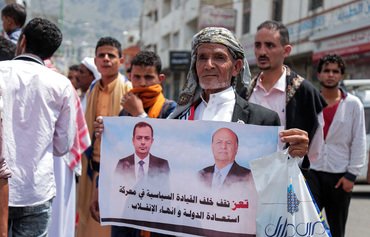Egyptian courts have been holding special sessions to prosecute "Islamic State of Iraq and the Levant" (ISIL) elements, many of whom have been arrested across Egypt over the last three years in connection with acts of terrorism.
"The security operations and arrests, which began in 2013 with the proliferation of ISIL’s ideology and the emergence of its cells in Egypt, have netted a large number of the group’s supporters and those who have pledged allegiance to it," said political researcher and Al-Azhar University professor Abdul Nabi Bakkar.
The individuals include those involved in promoting the group’s ideology and recruiting new members, he told Al-Mashareq.
"Legal prosecution of those accused of belonging to terrorist groups, particularly ISIL, is time consuming and very complex, as many of the procedures involved differ from those that apply to criminal trials involving crimes such as murder or attempted murder," he said.
"Terrorism trials take a very long time, especially since they relate to national security," he added.
After authorities conduct investigations, he said, the defendants are sent to trial, where they first appear before a criminal court and are later referred to courtrooms specialised in terrorism cases, he added.
Numerous cases on trial
The media has dubbed the most notorious of the current counter-terrorism trials the "Wilayat ISIL Helwan" case, said Mansoura University law professor Ahmed Omar.
Four defendants are accused of "seeking to join a terrorist group based outside Egypt as a prelude to carrying out terrorist acts in Egypt, against state institutions specifically", he told Al-Mashareq.
"The defendants also are charged with seeking to travel to Syria, and from there to Libya, to receive training and acquire combat skills," he said.
Another big case involves a group of 16 individuals referred to by the media as "the returnees", who were stopped at a border crossing with Libya as they attempted to return to Egypt, he said. They are accused of being involved in acts of violence outside Egypt and working to carry out terrorist attacks inside it.
Also under way is the trial of the nine member "al-Warraq cell", whose members are accused of attacking police, fomenting internal tension and disturbing the civil peace, Omar added.
Yet another group standing trial is an eight-member cell known in the media as "Wilayat ISIL Cairo", he said. Five of the cell members are in custody while the other three are still at large.
Cases that are nearing conclusion and sentencing include the trial of the nine-member "Tanta" cell, "proven to have communicated with ISIL elements abroad to co-ordinate attacks against security forces in the Nile Delta region", he said.
Counter-terrorism law
Defendants accused of involvement in armed or unarmed acts of terrorism, such as the promotion of extremist ideology or recruiting fighters, are put on trial under Egypt's new counter-terrorism law, said Regional Centre for Strategic Studies researcher and Cairo University criminal law professor Wael al-Sharimi.
The law, approved by Egyptian President Abdel Fattah al-Sisi on August 16, 2015, offers a precise definition of the groups and individuals who are to be tried under it, he told Al-Mashareq.
The new law defines a terrorist crime as "any felony or misdemeanor committed by using a means of terrorism or in order to achieve or carry out a terrorist act". This includes any call or threat to commit any such crime, "without prejudice to the provisions of the Penal Code".
"A terrorist act is defined by the law as any use of force, violence, threat or intimidation, domestically or abroad, for the purpose of disturbing public order or endangering the safety, interests or security of the community; harming individuals and terrorizing them; jeopardizing their lives, freedoms, public or private rights or security, or other freedoms and rights guaranteed by the constitution," al-Sharimi said.
This definition also includes any conduct committed with the intent "to harm communications, information, financial or banking systems, national economy, energy reserves, security stock of goods, food and water, or their integrity, or medical services in disasters and crises", he added.
"The terrorism law did not leave any loophole that a terrorist or terrorist group could exploit to escape [punishment]," al-Sharimi said.
"The law took into account the reality of the times, as it referred to, and rather focused on, the issue of communication with the outside world via modern communication networks," he added.
The law also enables the accused to be brought to trial on terrorism charges if they have exploited communications networks to promote the actions of terrorist groups, receive funds or engage in recruitment, he said.
Severe penalties for violators
The penalties prescribed by the counter-terrorism law are "very severe", al-Shamiri said.
These range from five years in prison -- the minimum sentence that can be handed down by a court that specialises in terrorism cases -- to life imprisonment and the death penalty, he said.
A prison sentence of no less than 10 years is prescribed for those who are found guilty of belonging to a terrorist group or receiving military training from such a group, he said.
Life imprisonment or the death penalty is handed down to those who establish, head or run a terrorist group, he added, while the penalty for financing terrorism is life imprisonment, and can include the death penalty.
The law also mandates severe penalties for those who promote terrorist ideology, with a minimum five-year prison sentence for those proven to be involved in the promotion of any terrorist group through the media, he said.

![Egyptians gather outside the High Court of Justice in Cairo. Egyptian courtrooms are currently trying a number of defendants on terrorism charges. [Waleed Abu al-Khair/Al-Mashareq]](/cnmi_am/images/2016/08/15/5990-Egypt-cairo-court-600_384.jpg)






